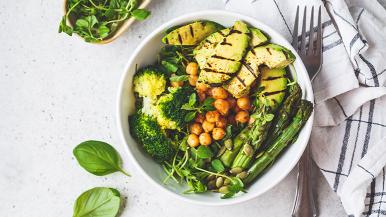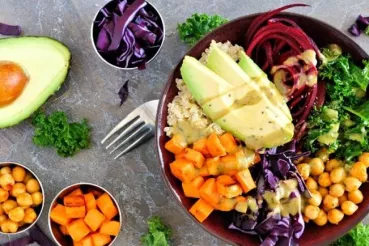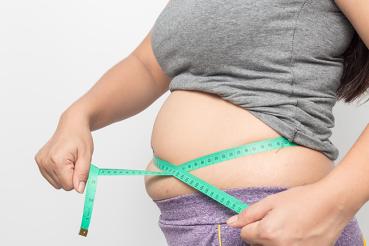Each day, more people are embracing a vegan, or plant-based, diet.
According to a 2019 article in The Economist, 25% of 25- to 34-year-old Americans say they are vegans or vegetarians. And interest in veganism hit an all-time high in 2020, according to a report by the food-focused website Chef's Pencil.
For some, shunning dairy, meat and other animal products may seem like an extreme sacrifice. For others, the personal and societal benefits associated with a vegan diet make the choice a no-brainer; for instance, many people care deeply about the welfare of animals. The potential health benefits alone inspire many to switch.
But is a vegan diet really that healthy?
Health benefits, when done right
Jeffrey Soble, MD, a cardiologist at Rush University Medical Center, began eating a plant-based diet nearly two year ago.
Like others, improving his health — he has a family history of heart disease — played a significant role in that decision. Research has shown that a vegan diet can help do the following:
- Promote weight loss
- Reduce your risk of heart disease by lowering cholesterol levels
- Lower your chances of getting certain types of cancer, such as colon cancer
- Manage diabetes by lowering A1C levels
But as Soble would tell any of his patients considering it themselves, going vegan doesn't automatically guarantee good health.
"You can be overweight and be a vegan; you can be malnourished and be a vegan," Soble says. "Whatever your diet choice, you have to know which foods to avoid and which foods to seek out."
The key: Planning
"Refined grains, sweets and junk food are troublemakers for everyone, not just vegans," Soble cautions. "And vegans and nonvegans alike can fall into the habit of making these items the mainstays of their diet."
To have a healthy diet of any kind, you need important nutrients. While many of these may have been plentiful when you ate dairy and meat, you'll need to find new ways to incorporate them into your diet as a vegan.
- Protein: Animals aren't the only sources of protein. Soy products (e.g., tofu and edamame) are also packed with protein. Other good sources include seitan (made from gluten), chickpeas, lentils and nutritional yeast.
- Vitamin B12: A lack of vitamin B12 can make you feel tired and weak. Getting enough vitamin B12, though, can be challenging for vegans because it can't be found in plants. To get your fill, stock up on fortified cereals, fortified rice and soy drinks — or take a supplement. The recommended daily amount for most adults is about 2.4 milligrams, but check with your doctor to see what's right for you.
- Essential fatty acids: A lack of essential fatty acids has been associated with problems related to brain heath, such as cognitive impairment and depression. To get your essential fatty acids, pile up the whole grains and leafy green vegetables (e.g., kale, spinach and collards). And try snacking on a small handful of unsalted nuts, like almonds, walnuts or pistachios (just watch your portions; nuts are high in calories).
- Iron: Red meat and egg yolks reign as the richest sources of iron. But they also are high in cholesterol. Good plant sources of iron include black-eyed peas, tofu and dried fruits (fresh fruit has iron, too, you just get more iron from dried fruit because you eat more).
- Vitamin D: Ten to 15 minutes of sunlight exposure a day can give you a vitamin D boost, as can fortified orange juice and soy.
Veganism doesn't have to be all or nothing. By creating your own roadmap and being realistic about what you want to achieve, you'll be more satisfied with making the change.
A few tips
Feel ready to make the change? To ease your transition, Soble offers a few suggestions:
- Talk to your partner first. Explain your reasons for making the change. Your partner may decide to make the journey with you, or you may have to go it alone. If you do choose to eat differently, discuss how that will work in terms of shopping, meal preparation and dining out.
- Take notes. Write down which vegan foods you've enjoyed in the past and where to get them. This can include prepared meals from your local grocer, your preferred brand of soy yogurt or tasty entrées at nearby restaurants. This handy list will help with last-minute meal planning, and help take the stress out of shopping and dining.
- Understand your own expectations. Will you ensure that every item you eat has no animal products by reading ingredient labels? Or will you take a different approach and have a little ice cream at birthday parties? Veganism doesn't have to be all or nothing. Take a close look at your goals and objectives and do what works best for you. "By creating your own roadmap and being realistic about what you want to achieve, you'll be more satisfied with making the change," Soble says.
- Remove hurdles. Can't go vegan because there's no Whole Foods or Trader Joe's nearby? These days, you don't need a gourmet or organic grocery store to shop vegan, Soble says. "In Chicago, more chain stores are opening in underserved communities and offering not only fresh produce but soy products as well," he says. Farmer's markets are also more plentiful. And, you don't need to have organic foods or even fresh produce to be a vegan. Frozen vegetables and fruits can also be part of a vegan diet.




